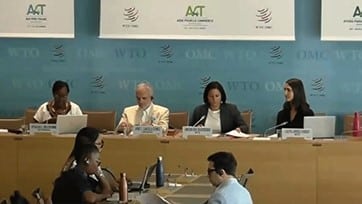La OMC pone en marcha una base de datos relativa a las disposiciones sobre igualdad de género de los acuerdos comerciales regionales

Los compromisos relativos a la igualdad de género de los acuerdos comerciales son fundamentales para promover los objetivos de desarrollo, ya que garantizan que las mujeres y los hombres puedan beneficiarse por igual de las oportunidades comerciales. Este fue el mensaje que transmitieron los oradores el 28 de julio durante una sesión acerca de la nueva base de datos de la OMC relativa a las disposiciones sobre género de los acuerdos comerciales regionales, que se puso en marcha durante el Examen Global de la Ayuda para el Comercio.
(de momento sólo en inglés)
This new policy tool “complements the ongoing work of the Informal Working Group on Trade and Gender on issues related to data collection, one of our priorities”, said Ambassador Athaliah Molokomme of Botswana, co-chair of the Informal Working Group on Trade and Gender.
The database maps more than 300 gender provisions included in more than 100 regional trade agreements (RTAs), representing almost a third of RTAs currently in force and notified to the WTO by members. The provisions identify the type of gender issue being addressed, the implementation instruments, and the enforcement mechanism.
The WTO Trade and Gender Officer, Lolita Laperle-Forget, who designed the database, stressed the importance of demystifying gender provisions in order to support the formulation of gender responsive RTAs and ensure that women are not left behind in trade opening policies. She observed that, although the first provision on gender equality was integrated in the Treaty of Rome in 1957, the practice of including gender provisions in RTAs truly emerged in the 1990s with the proliferation of RTAs worldwide and continues to increase.
Stressing that “the development index of the parties to an RTA has nothing to do with the commitments for gender equality”, Ms Laperle-Forget added that “many of these RTAs between developing countries provide for strong commitments for gender equality with specific action points targeted to promote women’s economic empowerment through trade.” She also noted that the database is a one-stop source for policymakers and other stakeholders engaged in trade, including women entrepreneurs. Its objective is to encourage members to formulate and implement provisions that address women’s specific needs.
Speaking of Botswana’s experience in mainstreaming gender at the regional level through the Southern African Development Community (SADC), Ambassador Molokomme said: “The declaration on gender in SADC was monitored through annual reporting at the level of heads of states. This was initially a non-binding declaration but every year, you could see countries competing to show that they had made progress. You would not believe what a difference this made to the way policymakers think about gender equality.”
Ambassador José Luis Cancela of Uruguay, Coordinator of the Informal Working Group on micro, small and medium-sized enterprises (MSMEs), pointed to a monitoring committee established as part of the 2018 Free Trade Agreement between Chile and Uruguay. “The duties of this committee are to facilitate the exchange of information and practices to best benefit women, to coordinate and evaluate the performance of the bilateral cooperation, and to dialogue with other international organizations, non-governmental organizations or other actors to foster the application of this chapter, ” he explained.
Providing objective information at a glance, the database on gender provisions “is one of the 12 gender-responsive policy tools that the WTO Trade and Gender Unit is developing to support WTO members in policymaking and in their trade agreements negotiations on gender”, said Anoush der Boghossian, Head of the Trade and Gender Unit.
The database on gender provisions in RTAs is available here.
More information about the work of the WTO Trade and Gender Unit can be found here.
The video playback of the session “What are the commitments for gender equality in regional trade agreements: Launch of the WTO database on gender provisions” is available here.















